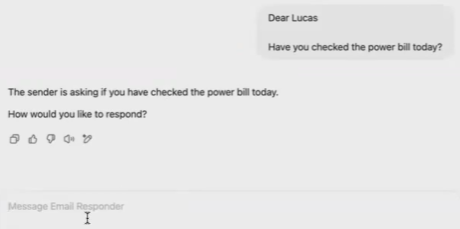I watched the fireside chat with Lucas Wright and came across a new term, “tool agnostic.” I looked it up and it means to be comfortable with using any tool at your disposal and not favoring any one tool overwhelmingly more than any other (especially within an IT context). I feel that this term is especially relevant when talking about AI. An agnostic is neither believer nor atheist and as AI has a tendency to take up a large amount of space in the public imaginings it is important to remember that at end of the day it is still simply a tool. As a tool it has several useful features and Lucas Wright displayed some his favorites. He showed how you can use GPTs made for custom purposes, the primary one that he showed as example was made to write responses to emails, as seen below.

The GPT that Wright showcased in the talk was capable of giving a description of the email and then writing an email based on your input:

Uses like this are, perhaps, less provocative than the many hypothetical uses and dangers of AI that have proposed over the years, but I feel that in it of itself is an important lesson. It is important to not place special emphasis on any new tool when it is not deserving of such. AI especially, partially due to the years of “hyping up” by popular media, has receive wide media attention in its development and this make it easy to believe that it is either very very good or very very bad, in reality its going to be a bit of both, but at least emails will be easier to write.
I also saw the talk with Dr. Mariel Miller on the drawbacks and potential learning advantages of AI. And there are potential advantages to using it (remember to be tool agnostic, as previously defined), as long as you have a well-thought strategy when implementing AI into your learning process. If you fail to account for how to use generative AI in your learning you may end up harming yourself and reducing your own credibility. Dr. Miller went over how you can use generative AI to summarize key findings in a report, make bullet points, and even improve your own writing grammatically. You can also use generative AI to sum up information if you have difficulty with comprehension (although this may be inadvisable given the sometimes unreliable quality of AI writing).